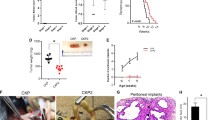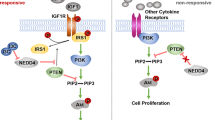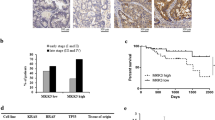Abstract
Human gastric carcinomas are among the most treatment-refractory epithelial malignancies. Increased understanding of the underlying molecular aberrations in such tumors could provide insights leading to improved therapeutic approaches. In this study, we characterized diverse genetic aberrations leading to constitutive Wnt signaling activation in a series of human gastric carcinoma cell lines. Downregulation of TCF signaling by stable transduction of dominant negative TCF4 (DNTCF4) resulted in inhibition of proliferation in Wnt-activated AGS tumor cells. c-Myc downregulation and the associated upregulation of its repression target, p21 observed in these tumor cells, as well as the profound growth inhibition induced by c-Myc small hairpin RNA (shRNA) implied their c-Myc addiction. In striking contrast, Wnt-activated MKN-28 and MKN-74 tumor cells appeared refractory to DNTCF4 inhibition of proliferation despite comparably decreased c-Myc expression levels. The resistance of these same tumor cells to growth inhibition by c-Myc shRNA established that their refractoriness to DNTCF was because of their independence from c-Myc for proliferation. There was no correlation between this resistance phenotype and the presence or absence of constitutive mitogen-activated protein kinase (MAPK) and/or AKT pathway activation, commonly observed in gastrointestinal tumors. However, in both DNTCF-sensitive and -resistant tumor cells with MAPK and/or AKT pathway activation, the ability of small molecule antagonists directed against either pathway to inhibit tumor cell growth was enhanced by Wnt pathway inhibition. These findings support the concept that although certain Wnt-activated tumors may escape c-Myc dependence for proliferation, disruption of other oncogenic pathways can unmask cooperative antiproliferative effects for Wnt pathway downregulation.
This is a preview of subscription content, access via your institution
Access options
Subscribe to this journal
Receive 50 print issues and online access
$259.00 per year
only $5.18 per issue
Buy this article
- Purchase on Springer Link
- Instant access to full article PDF
Prices may be subject to local taxes which are calculated during checkout






Similar content being viewed by others
Abbreviations
- (MAPK):
-
Ras/Raf/Erk
- (PI3K/AKT):
-
phosphatidylinositol 3-kinase/AKT
- (CRC):
-
colorectal cancer
- (FACS):
-
fluorescence activated cell sorting
- TCF:
-
T-cell factors
References
Akiri G, Cherian MM, Vijayakumar S, Liu G, Bafico A, Aaronson SA . (2009). Wnt pathway aberrations including autocrine Wnt activation occur at high frequency in human non-small-cell lung carcinoma. Oncogene 28: 2163–2172.
Alessi DR, Cuenda A, Cohen P, Dudley DT, Saltiel AR . (1995). PD 098059 is a specific inhibitor of the activation of mitogen-activated protein kinase kinase in vitro and in vivo. J Biol Chem 270: 27489–27494.
Bafico A, Gazit A, Wu-Morgan SS, Yaniv A, Aaronson SA . (1998). Characterization of Wnt-1 and Wnt-2-induced growth alterations and signaling pathways in NIH3T3 fibroblasts. Oncogene 16: 2819–2825.
Bas PLW, Friedel N, Nico JDB, Hugo WT, Winand NMD . (2000). Genetic alterations involving exon 3 of the β-catenin gene do not play a role in adenocarcinomas of the esophagus. Int J Cancer 86: 533–537.
Bechard M, Dalton S . (2009). Subcellular localization of glycogen synthase kinase 3-β controls embryonic stem cell self-renewal. Mol Cell Biol 29: 2092–2104.
Caca K, Kolligs FT, Ji X, Hayes M, Qian J, Yahanda A et al. (1999). β- and γ-catenin mutations, but not E-cadherin inactivation, underlie T-cell factor/lymphoid enhancer factor transcriptional deregulation in gastric and pancreatic cancer. Cell Growth Differ 10: 369–376.
Clements WM, Wang J, Sarnaik A, Kim OJ, MacDonald J, Fenoglio-Preiser C et al. (2002). β-catenin mutation is a frequent cause of Wnt pathway activation in gastric cancer. Cancer Res 62: 3503–3506.
D'Cruz CM, Gunther EJ, Boxer RB, Hartman JL, Sintasath L, Moody SE et al. (2001). c-MYC induces mammary tumorigenesis by means of a preferred pathway involving spontaneous Kras2 mutations. Nat Med 7: 235–239.
Filali M, Cheng N, Abbott D, Leontiev V, Engelhardt JF . (2002). Wnt-3A/β-catenin signaling induces transcription from the LEF-1 promoter. J Biol Chem 277: 33398–33410.
Giardiello FM, Offerhaus GJ, Lee DH, Krush AJ, Tersmette AC, Booker SV et al. (1993). Increased risk of thyroid and pancreatic carcinoma in familial adenomatous polyposis. Gut 34: 1394–1396.
Grabsch H, Takeno S, Noguchi T, Hommel G, Gabbert HE, Mueller W . (2001). Different patterns of β-catenin expression in gastric carcinomas: relationship with clinicopathological parameters and prognostic outcome. Histopathology 39: 141–149.
He T-C, Sparks AB, Rago C, Hermeking H, Zawel L, da Costa LT et al. (1998). Identification of c-MYC as a target of the APC pathway. Science 281: 1509–1512.
Ikenoue T, Ijichi H, Kato N, Kanai F, Masaki T, Rengifo W et al. (2002). Analysis of the β-catenin/T-cell factor signaling pathway in 36 gastrointestinal and liver cancer cells. Jpn J Cancer Res 93: 1213–1220.
Jang JW, Boxer RB, Chodosh LA . (2006). Isoform-specific ras activation and oncogene dependence during MYC- and Wnt-induced mammary tumorigenesis. Mol Cell Biol 26: 8109–8121.
Janssen K-P, Alberici P, Fsihi H, Gaspar C, Breukel C, Franken P et al. (2006). APC and oncogenic KRAS are synergistic in enhancing Wnt signaling in intestinal tumor formation and progression. Gastroenterology 131: 1096–1109.
Jho EH, Zhang T, Domon C, Joo CK, Freund JN, Costantini F . (2002). Wnt/β-catenin/Tcf signaling induces the transcription of Axin2, a negative regulator of the signaling pathway. Mol Cell Biol 22: 1172–1183.
Kim J-S, Crooks H, Dracheva T, Nishanian TG, Singh B, Jen J et al. (2002). Oncogenic β-catenin is required for bone morphogenetic protein 4 expression in human cancer cells. Cancer Res 62: 2744–2748.
Kim S-E, Lee W-J, Choi K-Y . (2007). The PI3 kinase-Akt pathway mediates Wnt3a-induced proliferation. Cellular Signal 19: 511–518.
Kolligs FT, Kolligs B, Hajra KM, Hu G, Tani M, Cho KR et al. (2000). γ-Catenin is regulated by the APC tumor suppressor and its oncogenic activity is distinct from that of β-catenin. Genes Dev 14: 1319–1331.
Michl P, Downward J . (2005). Mechanisms of disease: PI3K/AKT signaling in gastrointestinal cancers. Z Gastroenterol, 1133–1139.
Morin PJ, Spa rks AB, Korinek V, Barker N, Clevers H, Vogelstein B et al. (1997). Activation of β-catenin-Tcf signaling in colon cancer by mutations in β-catenin or APC. Science 275: 1787–1790.
Overman MJ . (2009). Recent advances in the management of adenocarcinoma of the small intestine. Gastrointest Cancer Res 3: 90–96.
Park K-S, Jeon SH, Kim S-E, Bahk Y-Y, Holmen SL, Williams BO et al. (2006). APC inhibits ERK pathway activation and cellular proliferation induced by RAS. J Cell Sci 119: 819–827.
Pfaffl MW . (2001). A new mathematical model for relative quantification in real-time RT-PCR. Nucleic Acids Res 29: e45.
Pumiglia KM, Decker SJ . (1997). Cell cycle arrest mediated by the MEK/mitogen-activated protein kinase pathway. Proc Natl Acad Sci USA 94: 448–452.
Rubin JS, Osada H, Finch PW, Taylor WG, Rudikoff S, Aaronson SA . (1989). Purification and characterization of a newly identified growth factor specific for epithelial cells. Proc Natl Acad Sci USA 86: 802–806.
Rubinfeld B, Robbins P, El-Gamil M, Albert I, Porfiri E, Polakis P . (1997). Stabilization of β-catenin by genetic defects in melanoma cell lines. Science 275: 1790–1792.
Shimizu M, Fukunaga Y, Ikenouchi J, Nagafuchi A . (2008). Defining the roles of β-catenin and plakoglobin in LEF/T-cell factor-dependent transcription using β-catenin/plakoglobin-null F9 cells. Mol Cell Biol 28: 825–835.
Slinker BK . (1998). The statistics of synergism. J Mol Cell Cardiol 30: 723–731.
Stampfer MR, Bartley JC . (1985). Induction of transformation and continuous cell lines from normal human mammary epithelial cells after exposure to benzo[a]pyrene. Proc Natl Acad Sci USA 82: 2394–2398.
Sunaga N, Kohno T, Kolligs FT, Fearon ER, Saito R, Yokota J . (2001). Constitutive activation of the Wnt signaling pathway by CTNNB1 (β-catenin) mutations in a subset of human lung adenocarcinoma. Genes Chromosomes Cancer 30: 316–321.
Suriano G, Vrcelj N, Senz J, Ferreira P, Masoudi H, Cox K et al. (2005). β-Catenin (CTNNB1) gene amplification: a new mechanism of protein overexpression in cancer. Genes Chromosomes Cancer 42: 238–246.
Teuliere J, Faraldo MM, Shtutman M, Birchmeier W, Huelsken J, Thiery JP et al. (2004). β-Catenin-dependent and -independent effects of δ N-plakoglobin on epidermal growth and differentiation. Mol Cell Biol 24: 8649–8661.
Tomita H, Yamada Y, Oyama T, Hata K, Hirose Y, Hara A et al. (2007). Development of gastric tumors in ApcMin/+ mice by the activation of the β-catenin/Tcf signaling pathway. Cancer Res 67: 4079–4087.
Van Cutsem E, Dicato M, Arber N, Benson A, Cunningham D, Diaz-Rubio E et al. (2006). The neo-adjuvant, surgical and adjuvant treatment of gastric adenocarcinoma. Current expert opinion derived from the Seventh World Congress on Gastrointestinal Cancer, Barcelona, 2005. Ann Oncol 17: vi13–vi18.
van de Wetering M, Sancho E, Verweij C, de Lau W, Oving I, Hurlstone A et al. (2002). The (β)-catenin/TCF-4 complex imposes a crypt progenitor phenotype on colorectal cancer cells. Cell 111: 241–250.
Vlahos CJ, Matter WF, Hui KY, Brown RF . (1994). A specific inhibitor of phosphatidylinositol 3-kinase, 2-(4-morpholinyl)-8-phenyl-4H-1-benzopyran-4-one (LY294002). J Biol Chem 269: 5241–5248.
Woo DK, Kim HS, Lee HS, Kang YH, Yang HK, Kim WH . (2001). Altered expression and mutation of β-catenin gene in gastric carcinomas and cell lines. Int J Cancer 95: 108–113.
Zhurinsky J, Shtutman M, Ben-Ze′ev A . (2000). Differential mechanisms of LEF/TCF family-dependent transcriptional activation by β-catenin and plakoglobin. Mol Cell Biol 20: 4238–4252.
Acknowledgements
We are grateful to Dr Yoshio Yamaoka (Baylor College of Medicine, Houston, TX, USA) for MKN-7 and MKN-28 cells; Dr Gary Schwartz (Department of Medicine, Memorial Sloan-Kettering Cancer Center, New York, NY, USA) for MKN-74 cells and Dr Reuben Lotan (MD Anderson Cancer Center, Houston, TX, USA) for KATO-II cells. SV is a recipient of a post-doctoral fellowship award from the American Urological Association. Grant support: This work was supported by grant number 5R01CA071672 from the National Cancer Institute.
Author information
Authors and Affiliations
Corresponding author
Ethics declarations
Competing interests
The authors declare no conflict of interest.
Additional information
Supplementary Information accompanies the paper on the Oncogene website
Rights and permissions
About this article
Cite this article
Asciutti, S., Akiri, G., Grumolato, L. et al. Diverse mechanisms of Wnt activation and effects of pathway inhibition on proliferation of human gastric carcinoma cells. Oncogene 30, 956–966 (2011). https://doi.org/10.1038/onc.2010.475
Received:
Revised:
Accepted:
Published:
Issue Date:
DOI: https://doi.org/10.1038/onc.2010.475
Keywords
This article is cited by
-
High-resolution chromatin immunoprecipitation (ChIP) sequencing reveals novel binding targets and prognostic role for SOX11 in mantle cell lymphoma
Oncogene (2015)
-
Quantitative analysis of the TNF-α-induced phosphoproteome reveals AEG-1/MTDH/LYRIC as an IKKβ substrate
Nature Communications (2015)
-
WNT6 is a novel target gene of caveolin-1 promoting chemoresistance to epirubicin in human gastric cancer cells
Oncogene (2013)
-
MDR-1, Bcl-xL, H. pylori, and Wnt/β-catenin signalling in the adult stomach: how much is too much?
Laboratory Investigation (2012)



